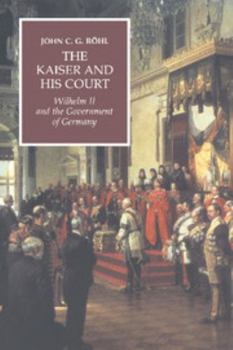The Kaiser and His Court: Wilhelm II and the Government of Germany
Select Format
Select Condition 
Book Overview
Kaiser Wilhelm II, Queen Victoria's eldest grandchild, took over the running of the powerful German Reich from Bismarck and within a couple of decades had led it into world war and collapse. How did the Kaiser come to have so much power? Why was there no one to help him steer a less disastrous course? This book analyses these crucial questions with the help of a wealth of new archival sources. The book begins with a character-sketch of the Kaiser...
Format:Paperback
Language:English
ISBN:0521565049
ISBN13:9780521565042
Release Date:July 1996
Publisher:Cambridge University Press
Length:288 Pages
Weight:0.90 lbs.
Dimensions:0.7" x 6.0" x 9.0"
Related Subjects
Ethnic & National Europe Germany History Ireland Irish Jewish Modern (16th-21st Centuries)Customer Reviews
4 ratings
Good!!
Published by Thriftbooks.com User , 21 years ago
Professor John Röhl of the University of Sussex has written extensively on Wilhelmine Germany, including his collection of essay entitled The Kaiser and his Court: Wilhelm II and the Government of Germany (1994). Röhl asserts that Wilhelm has for many years "been marginalized by professional German historians," who viewed the Kaiser as one "who played no part in shaping the policies of the Kaiserrreich." Other scholars have depicted him as "an aggressive autocrat who must bear a large degree of responsibility for plunging Old Europe into war and catastrophe." (xi) Regarding Wilhelm and the Great War, Röhl implies that his influence was negligible. The Kaiser was never a "full-scale" autocrat, and while he perhaps "dreamed of establishing absolute rule for himself...it remained no more than a dream." Röhl contends that this was particularly true in terms of military power, of which the emperor had very little. (3) However, Röhl shows that the Kaiser was not uninvolved in Germany's diplomatic and military decision-making process, notably at the start of the war. He cites Wilhelm's influence in the rejection of Britain's generous peace proposal in 1912, a move supported by his chancellor, Bethmann Hollweg, and one which might have forestalled war altogether. (6) For Röhl, the Kaiser's involvement in the Great War was heavily influenced by his personality. Wilhelm "never matured," and was seen as a child-like figure at army headquarters. This trait was coupled with a "notorious overestimation of his own abilities, and a refusal to accept constructive criticism. To emphasize the emperor's requirement that he be at center stage at all times, Röhl repeats the apposite bon mot that Wilhelm "insisted on being the stag at every hunt, the bride at every wedding and the corpse at every funeral." (11-13) These qualities did little to endear himself to senior military officers and worked to push the Kaiser to the sidelines of decision making as the war intensified. Röhl holds that Wilhelm's public and private antics brought much scorn down upon himself and the German monarchy as a whole. He opines that the history of the last hundred years," he opines, "has shown that a monarchy in a modern state can only hope to survive if it restricts itself firmly to its purely representational functions and avoids making any political comment and exerting any influence. That Wilhelm II did precisely the opposite is a matter of embarrassing record. (104)Röhl concludes that Wilhelm's role in the formation of Germany policies was not insignificant before the war, particularly with regard to the turn-of-the-century naval armaments race with Great Britain, and in the domestic arena-though he was "vulnerable to manipulation by his generals and his military entourage." (166) By late 1914, Röhl declares, Wilhelm's influence began to wane, though the awareness by military leaders of which plans, people or policies the emperor would and would not support acted as "a
provides insight into the government of Wilhelmine Germany
Published by Thriftbooks.com User , 24 years ago
This book is a very interesting look into the theory and practice of government under Wilhelm II - particularly in those years of "personal rule" after the dismissal of Bismarck from the chancellorship. The book is essentially a collection of essays devoted to various issues involving the Kaiser and his government. So while it is not structured like a conventional history of this era, or a biography of the Kaiser, an abundance of historical and biographical information is presented.I enjoyed this book very much - it is very well-written and was a pleasure to read. I think anyone interested in this period of German/European history will find reading this book well worth the effort.
Important Information
Published by Thriftbooks.com User , 24 years ago
This book talks about Wilhem II, and his court in Germany. It also speaks about the hatred that he had toward Jewish People. The book is very interesting, and it sets the record straight on alot of things. This book is a must!
Full of strong insights
Published by Thriftbooks.com User , 25 years ago
This is a solid, commendable introduction to the strange personality and courtly world of Germany's last emperor. It has much to say about the physical and psychological deformities that may explain why Kaiser Wilhelm behaved as he did. It is also extremely revealing about the depths of his vicious anti-Semitism. The book makes good use of rarely mined source material and is written in a pleasingly forceful style that commands the reader's attention.






